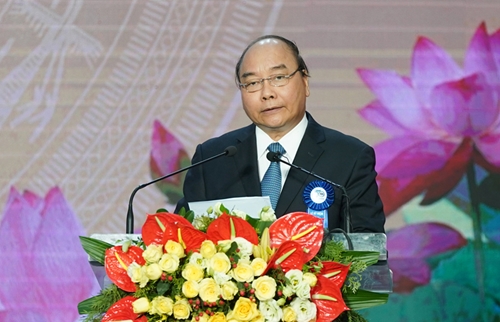Speaking at the event, PM Phuc expressed his delight at learning that the hospital has adopted technological advances for treatment.
Not only improving cancer check-ups and treatment, the hospital has also helped build tumour faculties in cities and provinces and a network of national cancer prevention system. It offered training and transferred technology to lower-level hospitals, contributing to cutting treatment costs and strengthening patients’ trust.
    |
 |
|
PM Nguyen Xuan Phuc addresses the ceremony. Photo: VGP |
In Vietnam, there are 165,000 new cancer cases each year and 300,000 patients are living with the disease.
The PM assigned the hospital to continue its vanguard role to become the leading tumour centre in the region, a trustworthy destination for not only patients but also international friends.
About future orientations, the hospital was asked to further improve its check-up and treatment, take patients’ satisfaction as a measurement for value, enhance scientific research and training, as well as international cooperation, especially with French institutes.
Together with improving medical staff’s capacity, it must step up early screening and discovery of cancer cases.
As for the hospital’s self-autonomy project, the leader suggested rallying domestic and foreign resources to upgrade its infrastructure and develop its personnel into a high-quality workforce.
Each year, the Vietnamese people spend over 2 billion USD on medical treatment, mostly cancer, in foreign countries.
Previously known as Curie Indochina Institute, the hospital was founded on October 19, 1923 by Pierre Moullin, a French national with an aim to treat cancer for Indochinese and French people.
On July 6, 1926, the institute changed its name to Radium Institute, the only cancer research centre in Indochina.
In 1959, it merged with Phu Doan hospital, now known as Viet Duc hospital, to become a cancer faculty during 1959-1969. Later in 1969, the Health Ministry decided to establish K Hospital.
The hospital now has a 1,500-strong staff and 2,400 beds.
Source: VNA